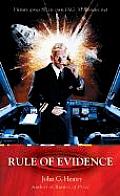
| Series: | Paul Sinclair #3 |
| Publisher: | Ace |
| Copyright: | March 2005 |
| ISBN: | 0-441-01262-0 |
| Format: | Mass market |
| Pages: | 276 |
This is the third book in the Paul Sinclair series, following his career as a space naval officer with secondary duties as ship's legal officer. While it has references to the previous books in the series and some of the relationships were established there, each book in this series is faily independent and it can probably be read in any order.
Lieutenant JG Sinclair still professes to dislike making a career of the legal system, but as Rule of Evidence opens with the normal routine naval operations in a near-future national space navy, readers of the series know that it's almost certain to follow the predictable pattern. Some sort of accident or catastrophe will happen, Sinclair will get sucked in somehow, and the book will end on a trial scene. It's that sort of series, as structurally standardized as a series television drama. It's important to know that going in. It lets you appreciate the series for what it is and pick something else if you want something less predictable.
Within that framework, Hemry again tells an engrossing, page-turning story, using a combination of excellent pacing, the inherent drama of a courtroom, and a ton of realistic-feeling military detail that structures the story and constantly gives Sinclair something that he has to be doing. The opening section is, as in the previous books, a bit weak, as Hemry re-establishes the background and characters. I always find his dialogue a bit off and forced at the start of the book. But once things heat up and the plot gets started, it improves considerably (either that, or I become so engrossed I don't care any more).
It's the third book and there's no in-story reason for why Sinclair should keep getting tangled up in this many high-profile cases, so suspension of disbelief does get a bit strained. Hemry goes very personal for the plot driver this time, which is emotionally effective but seems like a far-fetched coincidence. It's also a bit heavy-handed on the drama and personal angst, and I'm not sure I like that. There were plenty of moral quandries in the previous books without cranking the emotional knob up to eleven.
That said, ladling on that much emotion can be justified if the author does interesting things with it, and Hemry dodges around many of the standard angst patterns to take a hard look at survivor's guilt, the difficult angles of support and responsibility in relationships, and the impact of the legal system on an accused person. I was impressed. It more than makes up for a fairly predictable basic plot structure (the cause of the main problem of the book was obvious from very early on). Characters take damage and don't react like saints, hard choices don't always get easy answers, and there are pieces left to pick up even after success. It's deeper characterization than I'd expect from what's admittedly a rather formulaic series.
If you've read the earlier books, you probably know whether you'd like this one. They're all about the same, although this one adds more moral questions around emotion at the cost of legal procedure. It's the weakest book so far structurally, including a deus ex machina ending, but I thought it was the strongest in emotional character development.
Followed by Against All Enemies.
Reviewed: 2008-11-01